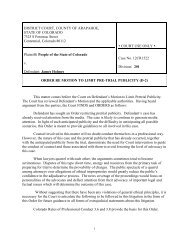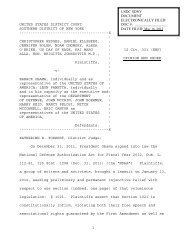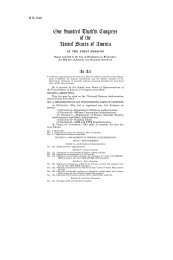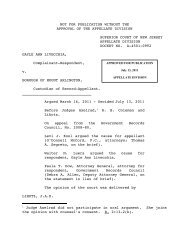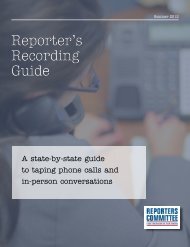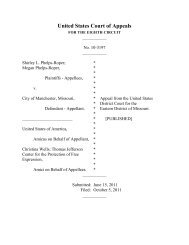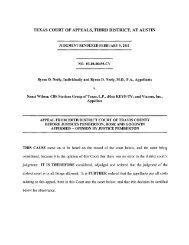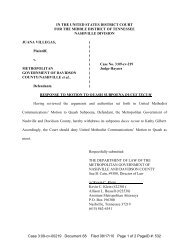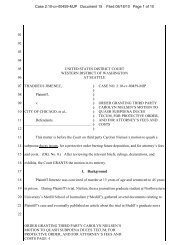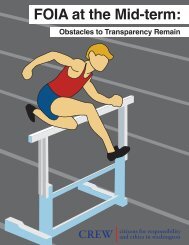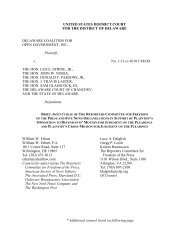April 1, 2013 The Honorable Patti Jo McKay Presiding Judge Los ...
April 1, 2013 The Honorable Patti Jo McKay Presiding Judge Los ...
April 1, 2013 The Honorable Patti Jo McKay Presiding Judge Los ...
Create successful ePaper yourself
Turn your PDF publications into a flip-book with our unique Google optimized e-Paper software.
Letter of <strong>The</strong> Reporters Committee for Freedom of the Press andNational Press Photographers Association, <strong>April</strong> 1, <strong>2013</strong>Page 4unnecessarily cut off at its source, for without freedom to acquire information the right topublish would be impermissibly compromised.‖ Id. at 728 (Stewart, J., joined by Brennan,J., and Marshall, J., dissenting).In Texas v. <strong>Jo</strong>hnson, the Court made clear that the interests protected by the FirstAmendment were not limited to the written word: ―<strong>The</strong> First Amendment literally forbids theabridgment only of ‗speech,‘ but we have long recognized that its protection does not end atthe spoken or written word. … [W]e have acknowledged that conduct may be ‗sufficientlyimbued with elements of communication to fall within the scope of the first and FourteenthAmendments.‖ 491 U.S. 397, 404 (1989). Moreover, newsgathering is essential topreserving a free press and the free flow of information, as ―freedom of the press can be nobroader than the freedom of reporters to investigate and report the news.‖ See Department ofJustice Policy with Regard to the Issuance of Subpoenas to Members of the News Media, 28C.F.R. § 50.10 (1998).Section 40008 cannot be exempt from First Amendment protection, as Petitionersclaim. No statute exists outside the parameters of the Constitution. See Marcus v. SearchWarrants, 367 U.S. 717, 731 (1961) (holding that no state is ―free to adopt whateverprocedures it pleases for dealing with obscenity as here involved without regard to thepossible consequences for constitutionally protected speech.‖). Further, the U.S. SupremeCourt made clear the responsibility courts have in scrutinizing statutory provisions to ensurespeech-related conduct – such as the ability of journalists to gather the news – is notunconstitutionally burdened:A legislature appropriately inquires into and may declare the reasonsimpelling legislative action but the judicial function commands analysis ofwhether the specific conduct charged falls within the reach of the statute andif so whether the legislation is consonant with the Constitution. Were itotherwise, the scope of freedom of speech and the press would be subject tolegislative definition and the function of the First Amendment as a check onlegislative power would be nullified.Landmark Comm. Inc. v. Virginia, 435 U.S. 829, 844 (1978). Moreover, because anotherwise valid law can conflict with the First Amendment, the court must consider whetherit is overbroad as applied in a given situation. As the Court has stated:<strong>The</strong> objectionable quality of vagueness and overbreadth does not depend uponabsence of fair notice to a criminally accused or upon unchanneled delegationof legislative powers, but upon the danger of tolerating, in the area of FirstAmendment freedoms, the existence of a penal statute susceptible of sweepingand improper application.NAACP v. Button, 371 U.S. 415, 432-33 (1963). Application of Section 40008 to a journalistengaged in the constitutionally protected act of newsgathering demands careful balancing of



